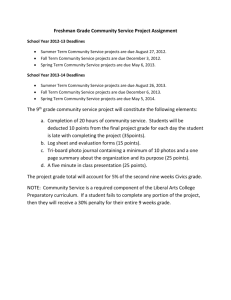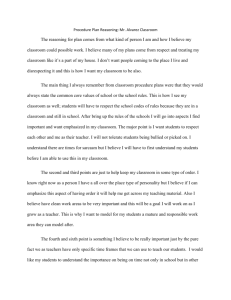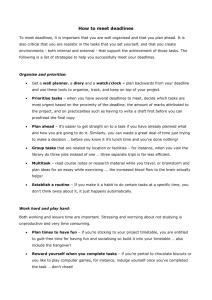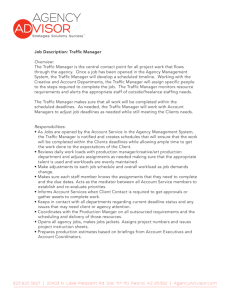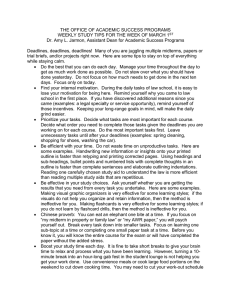Des Moines Register 09-09-07
advertisement
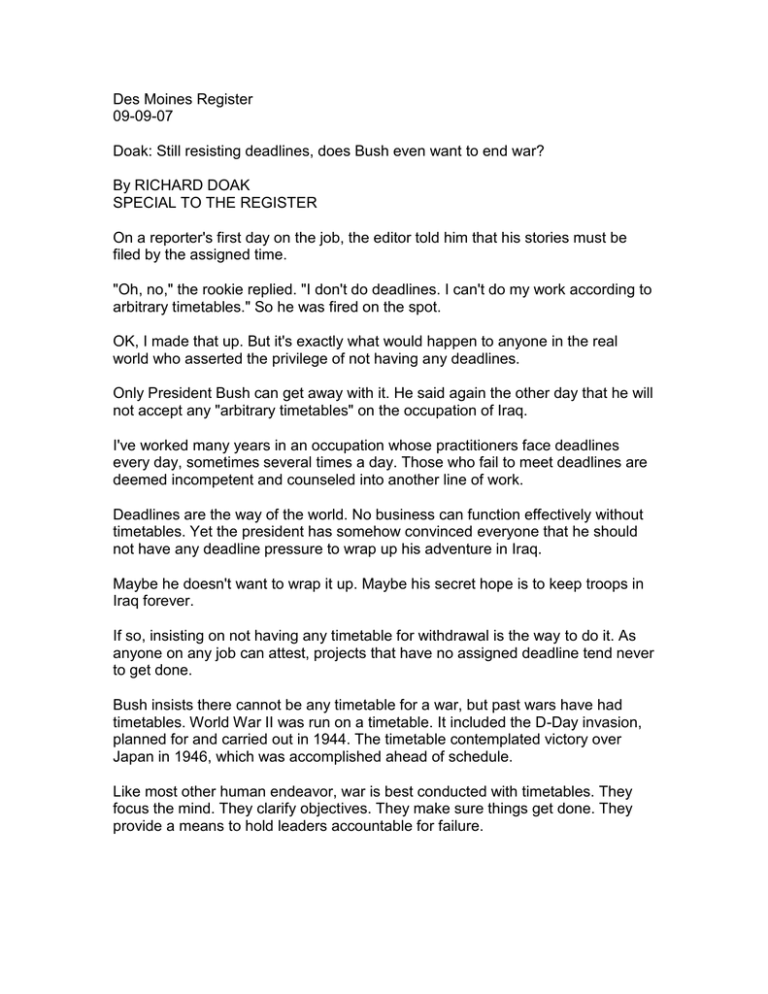
Des Moines Register 09-09-07 Doak: Still resisting deadlines, does Bush even want to end war? By RICHARD DOAK SPECIAL TO THE REGISTER On a reporter's first day on the job, the editor told him that his stories must be filed by the assigned time. "Oh, no," the rookie replied. "I don't do deadlines. I can't do my work according to arbitrary timetables." So he was fired on the spot. OK, I made that up. But it's exactly what would happen to anyone in the real world who asserted the privilege of not having any deadlines. Only President Bush can get away with it. He said again the other day that he will not accept any "arbitrary timetables" on the occupation of Iraq. I've worked many years in an occupation whose practitioners face deadlines every day, sometimes several times a day. Those who fail to meet deadlines are deemed incompetent and counseled into another line of work. Deadlines are the way of the world. No business can function effectively without timetables. Yet the president has somehow convinced everyone that he should not have any deadline pressure to wrap up his adventure in Iraq. Maybe he doesn't want to wrap it up. Maybe his secret hope is to keep troops in Iraq forever. If so, insisting on not having any timetable for withdrawal is the way to do it. As anyone on any job can attest, projects that have no assigned deadline tend never to get done. Bush insists there cannot be any timetable for a war, but past wars have had timetables. World War II was run on a timetable. It included the D-Day invasion, planned for and carried out in 1944. The timetable contemplated victory over Japan in 1946, which was accomplished ahead of schedule. Like most other human endeavor, war is best conducted with timetables. They focus the mind. They clarify objectives. They make sure things get done. They provide a means to hold leaders accountable for failure. Of course, sometimes deadlines cannot be met for reasons beyond anyone's control. When that happens, you set another timetable. Deadlines might be revised, but never abandoned. It looked as though September was shaping up as a deadline of sorts on Iraq. It appeared that, if a successful conclusion to the war wasn't within sight by now, Republicans in Congress might finally lose patience with their president and stop blocking the Democratic attempts to force a conclusion. The patience should have run out long ago. After all, Congress has given Bush everything he asked for and a totally free hand in Iraq, with nothing to show for it except death, debt and public anger. Nevertheless, it appears Congress will turn out to be a bottomless pit of patience. After a presidential PR blitz about some nebulous "progress," and after Lt. Gen. David Petraeus tells Congress what his commander in chief wants him to tell Congress this week, enough members will fall in line to prevent any change of direction. The sad fact is, the opinion of only one person matters on Iraq. Only one person will decide when American troops start coming home, if ever. That one person even gets to define what will constitute victory. As long as that one person gets to insist on having no timetables or deadlines for completing the mission, then there can never be a point at which his policies can be judged to have failed. Columnists can rant, editorialists can rail, the public can fume and members of Congress can sputter, but the American presence in Iraq will continue as long as George W. Bush, or his successor, thinks it should. That's because we - the public and Congress - ceded absolute war-making power to the president. We gave him an open-ended authorization to make war, we left it up to him to define the enemy and the objectives, and we failed to hold him accountable to any timeline. Now we can only hope that Iraqis will eventually grow sick of slaughtering one another and that the lull will let the president think we've won. Until then, unless Congress musters enough votes to set veto-proof deadlines, there's no choice but to keep giving him everything he wants to continue the occupation of Iraq as long as he wants. RICHARD DOAK is a retired Register editor and columnist and a lecturer in journalism at Iowa State University.
